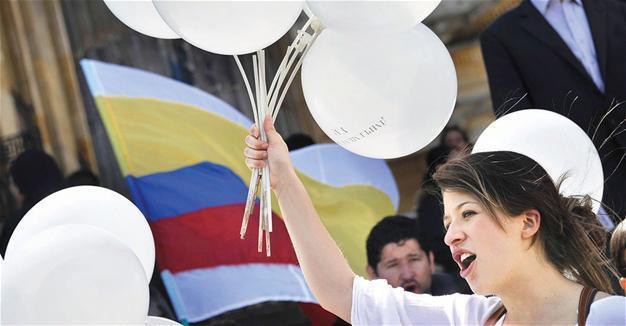Colombian Congress ratifies peace deal; critics boycott vote
OGOTA – The Associated Press
 The Congress formally ratified a revised peace agreement with Colombia’s biggest leftist rebel group, capping a torturous four years of negotiations, a stunning referendum rejection, last-minute compromises and two signing ceremonies.
The Congress formally ratified a revised peace agreement with Colombia’s biggest leftist rebel group, capping a torturous four years of negotiations, a stunning referendum rejection, last-minute compromises and two signing ceremonies.The initial pact was narrowly rejected by voters last month, and President Juan Manuel Santos decided to skip a referendum on the new version and go directly to congress, where the deal’s supporters hold a majority.
Opponents, led by former President Alvaro Uribe, boycotted the legislative votes, which resulted in unanimous approval by the Senate on Nov. 29, and by the lower house late Nov. 30.
The new 310-page accord with the Revolutionary Armed Forces of Colombia introduced 50 changes to the initial deal in an attempt to assuage opponents as the government seeks to end a 52-year conflict that has killed more than 220,000 people and driven almost 8 million from their homes.
The modifications include a prohibition on foreign magistrates judging alleged crimes by government or FARC troops, and a commitment from the rebels to forfeit assets, some amassed through drug trafficking, to help compensate victims. But the FARC rejected demands for jail sentences for rebel leaders responsible for atrocities and stricter limits on their future participation in politics.
The compromises weren’t enough for some of the deal’s opponents.
“There needs to be a balance between peace and justice, but in this agreement there’s complete impunity,” Uribe, now a senator, said during the Senate debate. Other senators accused him of standing in the way of a peace deal that he pursued with the FARC as president in 2002-10.
Santos said ratification will set in motion the start of a six-month process in which the FARC’s 8,000-plus guerrillas will concentrate in some 20 rural areas and turn over their weapons to United Nations monitors. “Tomorrow a new era begins,” he said Nov. 30.
But the rebels insist their troops will not start demobilizing until lawmakers pass an amnesty law freeing some 2,000 rebels in jail.
“D-Day starts after the first actions are implemented,” the rebel leader Pastor Alape, part of the FARC’s 10-member secretariat, said last week after the new accord was signed. “The president unfortunately has been demonstrating an attitude that creates confusion in the country.”
















